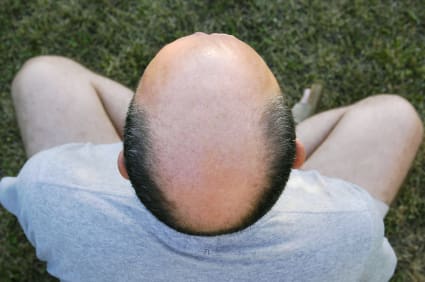Hair Loss Treatment
Handling Hair Loss
Are you experiencing hair loss? It’s something that can be very upsetting. Hair loss (alopecia) can affect just your scalp or your entire body. Sometimes hair loss can be just a temporary thing, or it can be something you will have to deal with permanently. But don’t suffer alone. The experts at Winston Salem Dermatology are here to help. We will figure out what’s behind your hair loss and recommend the best treatment possible to have you feeling and looking your best again.
Most Common Types of Hair Loss
There are a number of ways that people lose their hair. Hereditary thinning is the most common, but not all hair loss is genetic. Some people have medical issues that can cause their hair to fall out, like thyroid disease, iron deficiency, hormonal imbalances, and more. Here are the most common types of hair loss:
Involutional Alopecia
With this condition, hair naturally thins as you age. This causes hair follicles to go into a resting phase while the remaining hair becomes shorter and there are fewer of them.
Androgenic Alopecia
This is a generic condition that can impact both men and women. In men, this is often referred to as “male pattern baldness”. Balding can start as early as their teens. Usually, with men, this will start with a receding hairline and gradually thin around the crow of the head and front of the scalp. “Female pattern baldness” usually happens around the age of 40. Most women start losing hair across their entire scalp and see it happening around the crown of the head.
Alopecia Areata
This condition usually happens suddenly and is most often seen in children and adolescents. This could involve patchy hair loss, total baldness (alopecia totalis), or complete body hair loss (alopecia universalis). In most cases, the hair will grow back in a few years.
Trichotillomania
You may have heard this called “the hair-pulling disorder.” This is a self- inflicted condition most often diagnosed in children. With this psychological condition, children repeatedly pull out their own hair.
Telogen Effluvium
This is usually a temporary condition that occurs due to changes in the growth cycle of hair. It happens when a large number of hairs go into the resting phase at the same time, and excessive shedding and thinning happens.
Scarring Alopecia
Inflammatory skin problems cause permanent hair loss conditions. This happens when folliculitis, acne, or another skin condition causes scar tissue that destroys hair follicles and doesn’t allow hair to regrow.
Traction Alopecia
This is a gradual hair loss that is caused by constant pulling or tension on the hair. When this happens, inflammation and scarring occur, preventing the hair from growing in the future.
Causes for Hair Loss
It’s completely normal to brush your hair or run your fingers through it and see hair fall out. We actually shed about 100 hair each day. But if you’re losing hair faster than your body can produce new hair to replace it, there could be several of reasons why it’s happening.
Heredity
This is the most common form of hair loss. This happens with aging.
Illness
Pregnancy, childbirth, menopause, and thyroid problems are a few of the conditions that can cause permanent or temporary hair loss. Some medications used to treat illnesses like heart problems, cancer, arthritis, and high blood pressure can also cause hair to fall out.
Stress
A physical or emotional shock can cause hair to fall out temporarily.
Hairstyling and treatments
Excessive hairstyling where your hair is pulled back tight in styles like pigtails, cornrows, and cornrows can cause hair to fall out. Hot oil treatments and perms can also lead to hair loss. If scarring happens then, the hair loss could be permanent.
Related Pages
- Treatment for Flaky Facial Skin from Dandruff and Rosacea
- Glytone
- Avene
- Microblading vs. Eyebrow Tattooing: What’s the Difference, and Why Does it Matter?
- Forehead Botox: Everything You Need to Know about the Cost, Risks, and Benefits
- Bellafill: A Long-Lasting, Effective Dermal Filler Solution
- Sebaceous Hyperplasia: Causes, Symptoms, and Treatment
- Laser Hair Removal: The Superior Alternative
- Neck Lift
- Wrinkle Treatment
- Molluscum
- Seborrheic Keratosis
- Mole Removal
- Actinic Keratosis
- Contact Dermatitis
- Itchy Scalp Treatment
- Atypical Nevi
- Hyperhidrosis Treatment
- Melasma Treatment
- Cysts Treatment
- Psoriasis
- Warts Treatment
- Eczema Treatment
- Seborrheic Dermatitis Treatment
- Rosacea Treatment
- Fungal Infections
- Hair Loss Treatment
- Acne Treatment
Quick Quote
Treatment Options for Hair Loss
There are several surgical and medical treatments available to stop the process of hair loss and get your natural hair back. We can discuss why you’re losing your hair and find the best option to restore its growth. There are several surgeries and medications that can help you regrow your hair. Here are some of the most common hair loss treatment for women and men:
Surgical Treatments
- Hair Transplantation
During this procedure, hair is taken off the back of your own scalp and transplanted into an area that is thin or doesn’t have hair. Within two to three weeks after surgery, the transplanted hair will fall out, but you should start to notice new growth within a few months. - Scalp Reduction
During this surgery, parts of the scalp that are bald are removed, and the healthier areas are stretched in order to increase the appearance of a fuller head of hair. This can be done for hair loss treatment for men and for women. - Tissue Expansion
This involves stretching the scalp over a period of time.
Medical Treatments
- Finasteride (Propecia)
This is a prescription drug that can be used as a hair loss treatment for men. - Minoxidil (Rogaine)
This hair regrowth drug can be found at most local drugstores. Both men and women can use Rogaine, although women should use a lower-strength. Although this is an over-the-counter drug, make sure to talk with a hair loss expert at Winston Salem Dermatology to see if you are a good candidate for this drug.
Begin Your Hair Loss Treatment with Winston Salem Dermatology
Hair loss can be frustrating, scary, and sometimes embarrassing. With the right diagnosis, hair loss can be treated. No matter what type of hair loss you’re experiencing, we’re here to help personalize a solution for you. We will diagnose your hair loss problem and find out if you’re a good candidate for medication, surgery, or laser treatment for hair loss. Let us help you feel and look your best.Book your Consultation with Janet today! Call ☎ (336) 774-8636
Related Pages
- Treatment for Flaky Facial Skin from Dandruff and Rosacea
- Glytone
- Avene
- Microblading vs. Eyebrow Tattooing: What’s the Difference, and Why Does it Matter?
- Forehead Botox: Everything You Need to Know about the Cost, Risks, and Benefits
- Bellafill: A Long-Lasting, Effective Dermal Filler Solution
- Sebaceous Hyperplasia: Causes, Symptoms, and Treatment
- Laser Hair Removal: The Superior Alternative
- Neck Lift
- Wrinkle Treatment
- Molluscum
- Seborrheic Keratosis
- Mole Removal
- Actinic Keratosis
- Contact Dermatitis
- Itchy Scalp Treatment
- Atypical Nevi
- Hyperhidrosis Treatment
- Melasma Treatment
- Cysts Treatment
- Psoriasis
- Warts Treatment
- Eczema Treatment
- Seborrheic Dermatitis Treatment
- Rosacea Treatment
- Fungal Infections
- Hair Loss Treatment
- Acne Treatment
Quick Quote
Address
Winston Salem Dermatology & Surgery Center
1400 Westgate Center Drive,
Suite 200 - Winston Salem, NC 27103
Phone: 336.774.8636
Fax: 336.774.0265
www.WinstonSalemDermatology.com



